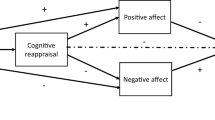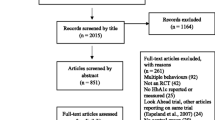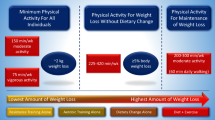Abstract
Obesity affects more than one third of US adults and is a major cause of preventable morbidity and mortality, primarily from cardiovascular disease. Traditional behavioral interventions for weight loss typically focus on diet and exercise habits and often give little attention to the role of stress and emotions in the initiation and maintenance of unhealthy behaviors, which may account for their modest results and considerable variability in outcomes. Stress eating and emotional eating are increasingly recognized as important targets of weight loss interventions. Mindfulness-based interventions were specifically developed to promote greater self-efficacy in coping with stress and negative emotions and appear to be effective for a variety of conditions. In recent years, researchers have begun to study mindfulness interventions for weight loss and CVD risk management. This review describes the rationale for the use of mindfulness in interventions for weight loss and CVD risk management, summarizes the research to date, and suggests priorities for future research.
Similar content being viewed by others
References
Papers of particular interest, published recently, have been highlighted as: • Of importance •• Of major importance
Krauss RM et al. Obesity: impact on cardiovascular disease. Circulation. 1998;98(14):1472–6.
Poirier P et al. Obesity and cardiovascular disease: pathophysiology, evaluation, and effect of weight loss: an update of the 1997 American Heart Association scientific statement on obesity and heart disease from the obesity committee of the council on nutrition, physical activity, and metabolism. Circulation. 2006;113(6):898–918.
Ogden CL et al. Prevalence of childhood and adult obesity in the United States, 2011-2012. JAMA. 2014;311(8):806–14.
Pack QR et al. The prognostic importance of weight loss in coronary artery disease: a systematic review and meta-analysis. Mayo Clin Proc. 2014;89(10):1368–77.
Smith Jr SC et al. AHA/ACCF secondary prevention and risk reduction therapy for patients with coronary and other atherosclerotic vascular disease: 2011 update: a guideline from the American Heart Association and American College Of Cardiology Foundation endorsed by the World Heart Federation and the Preventive Cardiovascular Nurses Association. J Am Coll Cardiol. 2011;58(23):2432–46.
Anderson JW et al. Long-term weight-loss maintenance: a meta-analysis of US studies. Am J Clin Nutr. 2001;74(5):579–84.
Faucher MA. How to lose weight and keep it off: what does the evidence show? Nurs Womens Health. 2007;11(2):170–9.
Franz MJ et al. Weight-loss outcomes: a systematic review and meta-analysis of weight-loss clinical trials with a minimum 1-year follow-up. J Am Diet Assoc. 2007;107:1755–67.
Burke LE, Wang J. Treatment strategies for overweight and obesity. J Nurs Scholarsh. 2011;43(4):368–75.
Jensen MD et al. 2013 AHA/ACC/TOS guideline for the management of overweight and obesity in adults: a report of the American College Of Cardiology/American Heart Association Task Force on practice guidelines and the obesity society. Circulation. 2014;129(25 Suppl 2):S102–38.
Dallman MF. Stress-induced obesity and the emotional nervous system. Trends Endocrinol Metab. 2010;21(3):159–65.
Sinha R, Jastreboff AM. Stress as a common risk factor for obesity and addiction. Biol Psychiatry. 2013;73(9):827–35. This review synthesizes findings from the literature and the authors’ own work pointing to common psychological and neurobiological mechanisms underlying the effects of stress on reward-mediated consumption of comfort of highly palatable foods and addictive substances, and suggests future directions for research on how stress increases the risk of obesity.
Warne JP. Shaping the stress response: interplay of palatable food choices, glucocorticoids, insulin and abdominal obesity. Mol Cell Endocrinol. 2009;300(1-2):137–46.
Block JP et al. Psychosocial stress and change in weight among US adults. Am J Epidemiol. 2009;170(2):181–92.
Danese A, Tan M. Childhood maltreatment and obesity: systematic review and meta-analysis. Mol Psychiatry. 2014;19(5):544–54.
Midei AJ, Matthews KA. Interpersonal violence in childhood as a risk factor for obesity: a systematic review of the literature and proposed pathways. Obes Rev. 2011;12(5):e159–72.
Tsenkova V, Boylan JM, Ryff C. Stress eating and health. Findings from MIDUS, a national study of US adults. Appetite. 2013;69:151–5.
Wardle J et al. Stress and adiposity: a meta-analysis of longitudinal studies. Obesity (Silver Spring). 2011;19(4):771–8.
Adam TC, Epel ES. Stress, eating and the reward system. Physiol Behav. 2007;91(4):449–58.
Torres SJ, Nowson CA. Relationship between stress, eating behavior, and obesity. Nutrition. 2007;23(11):887–94.
Koenders PG, van Strien T. Emotional eating, rather than lifestyle behavior, drives weight gain in a prospective study in 1562 employees. J Occup Environ Med. 2011;53:1287–93.
Niemeier HM et al. Internal disinhibition predicts weight regain following weight loss and weight loss maintenance. Obesity (Silver Spring). 2007;15:2485–94.
Butryn ML, Thomas JG, Lowe MR. Reductions in internal disinhibition during weight loss predict better weight loss maintenance. Obesity (Silver Spring). 2009;17(5):1101–3.
Teixeira PJ et al. Mediators of weight loss and weight loss maintenance in middle-aged women. Obesity (Silver Spring). 2010;18(4):725–35.
Tomiyama AJ, Dallman MF, Epel ES. Comfort food is comforting to those most stressed: evidence of the chronic stress response network in high stress women. Psychoneuroendocrinology. 2011;36(10):1513–9.
Tryon MS et al. Chronic stress exposure may affect the brain’s response to high calorie food cues and predispose to obesogenic eating habits. Physiol Behav. 2013;120:233–42.
Gibson EL. The psychobiology of comfort eating: implications for neuropharmacological interventions. Behav Pharmacol. 2012;23(5-6):442–60.
Goldschmidt AB et al. Affect and eating behavior in obese adults with and without elevated depression symptoms. Int J Eat Disord. 2014;47(3):281–6.
Arnsten AF. Stress signalling pathways that impair prefrontal cortex structure and function. Nat Rev Neurosci. 2009;10(6):410–22.
O’Reilly GA et al. Mindfulness-based interventions for obesity-related eating behaviours: a literature review. Obes Rev. 2014;15(6):453–61.
Kabat‐Zinn J. Mindfulness based interventions in context: past, present, and future. Clin Psychol Sci Pract. 2003;10(2):144–56.
Perlman DM et al. Differential effects on pain intensity and unpleasantness of two meditation practices. Emotion. 2010;10(1):65–71.
Zeidan F et al. Mindfulness meditation-related pain relief: evidence for unique brain mechanisms in the regulation of pain. Neurosci Lett. 2012;520(2):165–73.
Brewer JA et al. Meditation experience is associated with differences in default mode network activity and connectivity. Proc Natl Acad Sci U S A. 2011;108(50):20254–9.
Holzel BK et al. How does mindfulness meditation work? proposing mechanisms of action from a conceptual and neural perspective. Perspect Psychol Sci. 2011;6(6):537–59.
Tang YY, Holzel BK, Posner MI. The neuroscience of mindfulness meditation. Nat Rev Neurosci. 2015;16(4):213–U80. A clear and comprehensive review of the literature on the neural correlates and mechanisms of mindfulness meditation including a critique of methodological limitations and recommendations for future research.
Kabat-Zinn J, University of Massachusetts Medical Center/Worcester. Stress Reduction Clinic. Full catastrophe living : using the wisdom of your body and mind to face stress, pain, and illness. New York, N.Y: Delacorte Press; 1990. p. 453.
Segal ZV, Williams JMG, Teasdale JD. Mindfulness-based cognitive therapy for depression : a new approach to preventing relapse. New York: Guilford Press; 2002. p. 351.
Bowen S et al. Mindfulness-based relapse prevention for substance use disorders: a pilot efficacy trial. Subst Abus. 2009;30(4):295–305.
Hayes SC, Strosahl KD, Wilson KG. Acceptance and commitment therapy: an experiential approach to behavior change. 1999.
Grossman P et al. Mindfulness-based stress reduction and health benefits. A meta-analysis. J Psychosom Res. 2004;57(1):35–43.
Khoury B et al. Mindfulness-based stress reduction for healthy individuals: a meta-analysis. J Psychosom Res. 2015;78(6):519–28.
Goyal M et al. Meditation programs for psychological stress and well-being: a systematic review and meta-analysis. JAMA Intern Med. 2014;174:357–68.
Khoury B et al. Mindfulness-based therapy: a comprehensive meta-analysis. Clin Psychol Rev. 2013;33(6):763–71.
Piet J, Hougaard E. The effect of mindfulness-based cognitive therapy for prevention of relapse in recurrent major depressive disorder: a systematic review and meta-analysis. Clin Psychol Rev. 2011;31(6):1032–40.
Bowen S et al. Relative efficacy of mindfulness-based relapse prevention, standard relapse prevention, and treatment as usual for substance Use disorders. JAMA Psychiatry. 2014;71(5):547–56.
Katterman SN et al. Mindfulness meditation as an intervention for binge eating, emotional eating, and weight loss: a systematic review. Eat Behav. 2014;15(2):197–204. This was the first systematic review to examine interventions that used mindfulness as the primary intervention for subclinical disordered eating or weight loss.
Kristeller JL, Wolever RQ. Mindfulness-based eating awareness training for treating binge eating disorder: the conceptual foundation. Eat Disord. 2011;19(1):49–61. Presents the theoretical underpinnings of mindfulness-based approaches to obesity-related eating behaviors.
Kristeller J, Wolever RQ, Sheets V. Mindfulness based eating awareness training (MB-EAT) for binge eating: a randomized clinical trial. Mindfulness. 2013;5:282–97.
Daubenmier J et al. Mindfulness intervention for stress eating to reduce cortisol and abdominal Fat among overweight and obese women: an exploratory randomized controlled study. J Obes. 2011;2011:651936.
Alberts HJ, Thewissen R, Raes L. Dealing with problematic eating behaviour. The effects of a mindfulness-based intervention on eating behaviour, food cravings, dichotomous thinking and body image concern. Appetite. 2012;58:847–51.
Dalen J et al. Pilot study: Mindful Eating and Living (MEAL): weight, eating behavior, and psychological outcomes associated with a mindfulness-based intervention for people with obesity. Complement Ther Med. 2010;18:260–4.
Miller CK et al. Comparative effectiveness of a mindful eating intervention to a diabetes self-management intervention among adults with type 2 diabetes: a pilot study. J Acad Nutr Diet. 2012;112(11):1835–42.
Timmerman GM, Brown A. The effect of a mindful restaurant eating intervention on weight management in women. J Nutr Educ Behav. 2012;44:22–8.
Miller CK et al. Comparison of a mindful eating intervention to a diabetes self-management intervention among adults with type 2 diabetes: a randomized controlled trial. Health Educ Behav: Off Publ Soc Public Health Educ. 2014;41:145–54. This randomized controlled trial of Type 2 diabetics compared a 12-week MB-EAT intervention adapted for diabetics to include medical nutrition therapy with a diabetes group self-management education program. Both groups demonstrated significant improvements in weight loss, caloric consumption and glycemic control at program completion and 3-month follow-up and the authors concluded that both interventions were effective for diabetes self-management.
Lillis J et al. Teaching acceptance and mindfulness to improve the lives of the obese: a preliminary test of a theoretical model. Ann Behav Med. 2009;37(1):58–69.
Forman EM et al. Comparison of acceptance-based and standard cognitive-based coping strategies for craving sweets in overweight and obese women. Eat Behav. 2013;14:64–8.
Loucks EB, et al. Positive associations of dispositional mindfulness with cardiovascular health: the new England family study. Int J Behav Med, 2014.
de Souza IC et al. Mindfulness-based interventions for the treatment of smoking: a systematic literature review. J Altern Complement Med. 2015;21(3):129–40.
Brewer JA et al. Mindfulness training for smoking cessation: results from a randomized controlled trial. Drug Alcohol Depend. 2011;119(1-2):72–80.
Elwafi HM et al. Mindfulness training for smoking cessation: moderation of the relationship between craving and cigarette use. Drug Alcohol Depend. 2013;130(1-3):222–9.
Davis JM et al. Randomized trial on mindfulness training for smokers targeted to a disadvantaged population. Subst Use Misuse. 2014;49(5):571–85.
Davis JM et al. Mindfulness training for smokers via web-based video instruction with phone support: a prospective observational study. BMC Complement Altern Med. 2015;15:95.
Ruscio AC, et al. Effect of brief mindfulness practice on self-reported affect, craving, and smoking: a pilot randomized controlled trial using ecological momentary assessment. Nicotine Tob Res, 2015.
Garrison KA et al. A randomized controlled trial of smartphone-based mindfulness training for smoking cessation: a study protocol. BMC Psychiatry. 2015;15:83.
Abbott RA et al. Effectiveness of mindfulness-based stress reduction and mindfulness based cognitive therapy in vascular disease: a systematic review and meta-analysis of randomised controlled trials. J Psychosom Res. 2014;76(5):341–51. This systematic review identfiied nine articles (from 8 RCTs) describing results of MBIs for patients with hypertension, diabetes, heart disease and stroke. Meta-analyses conducted on data from 578 patients revealed beneficial effects for stress, depression and anxiety, with less robust findings for physical outcomes.
Blom K et al. Hypertension analysis of stress reduction using mindfulness meditation and yoga: results from the harmony randomized controlled trial. Am J Hypertens. 2014;27(1):122–9.
de la Fuente M, Franco C, Salvador M. Reduction of blood pressure in a group of hypertensive teadhers through a program of mindfulness meditation. Psicol Conduct. 2010;18:533–52.
Hughes JW et al. Randomized controlled trial of mindfulness-based stress reduction for prehypertension. Psychosom Med. 2013;75:721–8.
Hartmann M et al. Sustained effects of a mindfulness-based stress-reduction intervention in type 2 diabetic patients: design and first results of a randomized controlled trial (the Heidelberger diabetes and stress-study). Diabetes Care. 2012;35(5):945–7.
Gregg JA et al. Improving diabetes self-management through acceptance, mindfulness, and values: a randomized controlled trial. J Consult Clin Psychol. 2007;75(2):336–43.
Youngwanichsetha S, Phumdoung S, Ingkathawornwong T. The effects of mindfulness eating and yoga exercise on blood sugar levels of pregnant women with gestational diabetes mellitus. Appl Nurs Res. 2014;27(4):227–30.
van Son J et al. Mindfulness-based cognitive therapy for people with diabetes and emotional problems: long-term follow-up findings from the DiaMind randomized controlled trial. J Psychosom Res. 2014;77(1):81–4.
Tovote KA et al. Long-term effects of individual mindfulness-based cognitive therapy and cognitive behavior therapy for depressive symptoms in patients with diabetes: a randomized trial. Psychother Psychosom. 2015;84(3):186–7.
Tapper K et al. Exploratory randomised controlled trial of a mindfulness-based weight loss intervention for women. Appetite. 2009;52(2):396–404.
Moffitt R, Mohr P. The efficacy of a self-managed acceptance and commitment therapy intervention DVD for physical activity initiation. Br J Health Psychol. 2015;20(1):115–29.
Ivanova E et al. Acceptance and commitment therapy improves exercise tolerance in sedentary women. Med Sci Sports Exerc. 2015;47(6):1251–8.
Kangasniemi AM et al. Towards a physically more active lifestyle based on one’s own values: the results of a randomized controlled trial among physically inactive adults. BMC Public Health. 2015;15:260.
Tapper K et al. Exploratory randomised controlled trial of a mindfulness-based weight loss intervention for women. Appetite. 2009;52:396–404.
Loucks E, et al. Mindfulness and cardiovascular disease risk: state of the evidence, plausible mechanisms, and theoretical framework. Curr Cardiol Rep. (under review).
Pbert L et al. Effect of mindfulness training on asthma quality of life and lung function: a randomised controlled trial. Thorax. 2012;67(9):769–76.
Onken LS et al. Reenvisioning clinical science: unifying the discipline to improve the public health. Clin Psychol Sci. 2014;2(1):22–34.
Ball K, Crawford D. Socioeconomic status and weight change in adults: a review. Soc Sci Med. 2005;60(9):1987–2010.
Powell-Wiley TM et al. Change in neighborhood socioeconomic status and weight gain: Dallas heart study. Am J Prev Med. 2015;49(1):72–9.
Davis EM et al. Racial and socioeconomic differences in the weight-loss experiences of obese women. Am J Public Health. 2005;95(9):1539–43.
Hartmann-Boyce J et al. Self-help for weight loss in overweight and obese adults: systematic review and meta-analysis. Am J Public Health. 2015;105(3):e43–57.
Richardson S et al. Meta-analysis of perceived stress and its association with incident coronary heart disease. Am J Cardiol. 2012;110(12):1711–6.
Rosengren A et al. Association of psychosocial risk factors with risk of acute myocardial infarction in 11119 cases and 13648 controls from 52 countries (the INTERHEART study): case-control study. Lancet. 2004;364(9438):953–62.
Acknowledgments
This work was supported by the National Institute of Health (NIH) R34AT006963 to C.F. Its contents are solely the responsibility of the authors and do not necessarily represent the official views of the NIH or the UMMS Center for Mindfulness.
Compliance with Ethics Guidelines
ᅟ
Conflict of Interest
Carl Fulwiler, Eric Loucks, and Sinead Sinnott have no relevant disclosures to report. Judson Brewer is a stockholder in Claritas Mindsciences.
Human and Animal Rights and Informed Consent
This article does not contain any studies with human or animal subjects performed by the author.
Author information
Authors and Affiliations
Corresponding author
Additional information
This article is part of the Topical Collection on Novel + Emerging Risk Factors
Rights and permissions
About this article
Cite this article
Fulwiler, C., Brewer, J.A., Sinnott, S. et al. Mindfulness-Based Interventions for Weight Loss and CVD Risk Management. Curr Cardiovasc Risk Rep 9, 46 (2015). https://doi.org/10.1007/s12170-015-0474-1
Published:
DOI: https://doi.org/10.1007/s12170-015-0474-1




